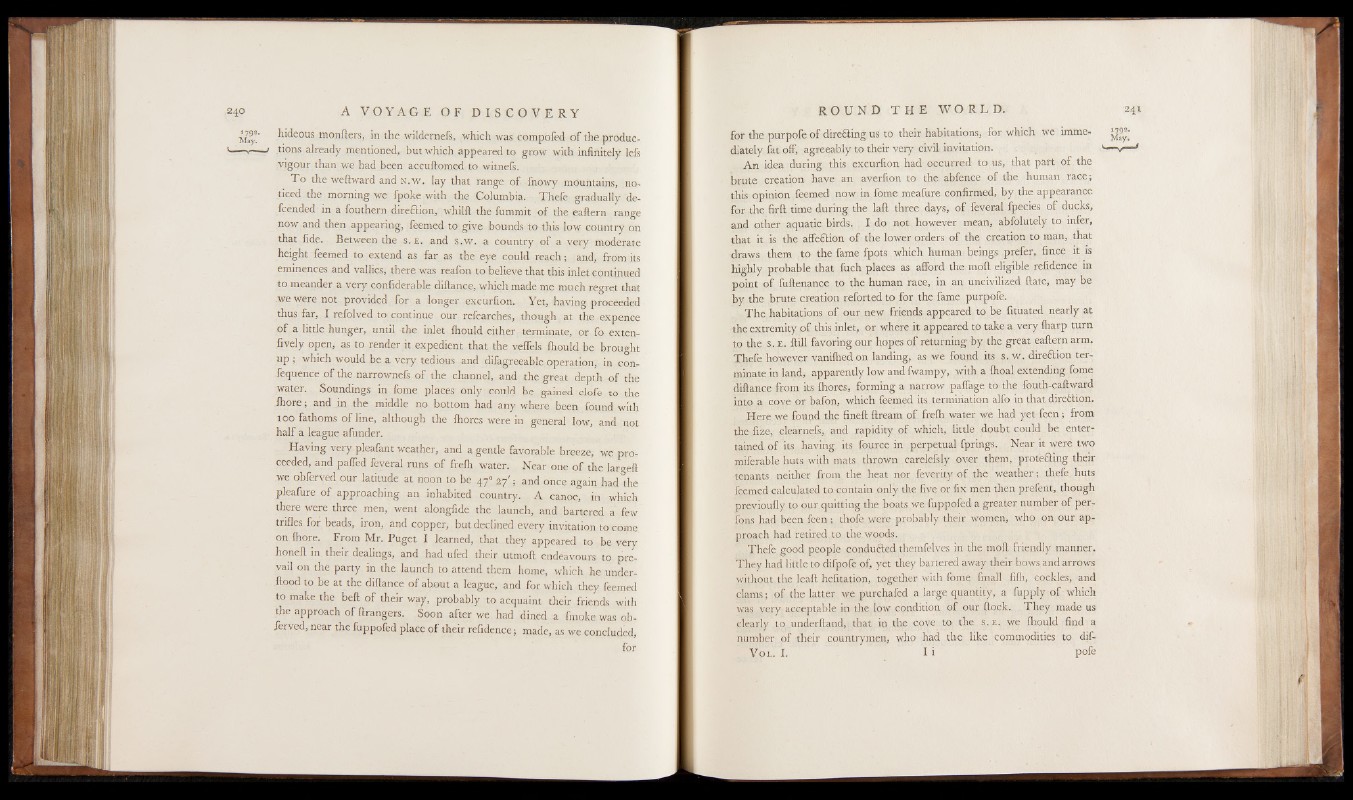
iviay!' .h^eous monfters, in the wildernefs, which was compofed of the produc-
—■---J ti°ns already mentioned, but which appeared to grow with infinitely lefs
vigour than we had been accuftomed to witnefs.
To the weft ward and N.w. lay that range of. fnowy mountains, noticed
the morning we fpoke with the Columbia. Thefe gradually de-
fcCnded in a fouthern direftion, whilft the fummit o f the eaftern range
now and then appearing, feemed to give bounds to this low country on
that fide. Between the s. e . and s.w. a country of a very moderate
height feemed to extend as far as the eye could reach; and, from its
eminences and vallies, there was reafon to believe that this inlet continued
to meander a very confiderable diftance, which made me much regret that
.we were not provided for a longer excurfion. Yet, having proceeded
thus far, I relolved to continue our refearches, though at the expence
o f a little hunger, until the inlet Ihould either terminate, or fo exten-
fively open, as to render it expedient that the veflels Ihould be brought
up ; which would be a very tedious and difagreeable operation, in con-
fequence of the narrownefs of the channel, and the great depth of the
water. Soundings in fome places only could be gained clofe to the
Ihore; and in the middle no bottom had any where been found with
too fathoms of line, although the Ihores were in general low, and not
half a league afunder.
Having very pleafant weather, and a gentle favorable breeze, we proceeded,
and palled feveral runs of frelh water. Near one o f the largeft
we obferved our latitude at noon to be 47= 27' ; and once again had the
pleafure o f approaching an inhabited country. A canoe, in which
there were three men, went alongfide the launch, and bartered a few
trifles for beads, iron, and copper, but declined every invitation to come
on Ihore. From Mr. Puget I learned, that they appeared to be very
honeft in their dealings, and had ufed their utmoft endeavours to prevail
on the party in the launch to attend them home, which he under-
ftood to be at the diftance of about a Teague, and for which they feemed
to make the bell of their wav?, probably to acquaint their friends with
the approach of ftrangers. Soon after we had dined a fmoke was obferved,
near the fuppofed place of their refidence; made, as we concluded,
for
for the purpofe of directing us to their habitations, for which we immediately
fat off, agreeably to their very civil invitation.
An idea during this excurfion had occurred to us, that part of the
brute creation have an averfion to the abfence of the human race;
this opinion feemed now in fome meafure confirmed, by the appearance
for the firft time during the laft three days, of feveral fpecies of ducks,
and other aquatic birds. I do not however mean, abfolutely to infer,
that it is the affection of the lower orders of the creation to man, that
draws them to the fame fpots which human beings prefer, fince it is
highly probable that fuch places as afford the moft eligible refidence in
point of fuftenance to the human race, in an uncivilized ftate, may be
by the brute creation reforted to for the fame purpofe.
The habitations of our new friends appeared to be fituated nearly at
the extremity of this inlet, or where it appeared to take a very lharp turn
to the s. e . ftill favoring our hopes of returning by the great eaftern arm.
Thefe however vanifhedon landing, as we found its s .w . direction terminate
in land,- apparently low and fwampy, with a Ihoal extending fome
diftance from its Ihores, forming a narrow palfage to the fouth-eaftward
into a cove or bafon, which feemed its termination alfo in that direftion.
Here we found the fineftftream of frelh water we had yet feen; from
the fize, clearnefi, and rapidity of which, little doubt could be entertained
of its having its fource in perpetual fprings. Near it were two
miferable huts with mats, thrown carelefsly over them, protefting their
tenants neither from the heat nor feverity of the weather; thefe huts
feemed calculated to contain only the five or fix men then prefent, though
previoufly to our quitting the boats we fuppofed a greater number of persons
had been feen ; thofe were probably their women, who on our approach
had retired to the. woods.
Thefe good people conduced themfelves in the moft friendly manner.
They had little to difpofe of, yet they bartered away their bows and arrows
without.the leaft hefitation, together with fome fmall filh, cockles, and
clams; of the latter we purchafed a large quantity, a fupply of which
was very acceptable in the,low condition of our ftock. They made us
clearly to underhand, that in the cove to the s. e . we Ihould find a
number of their countrymen, who had the like commodities to dif-
V o l . I. I i pole